Typeform vs. SurveyMonkey: Which Is Better for You? [2025]
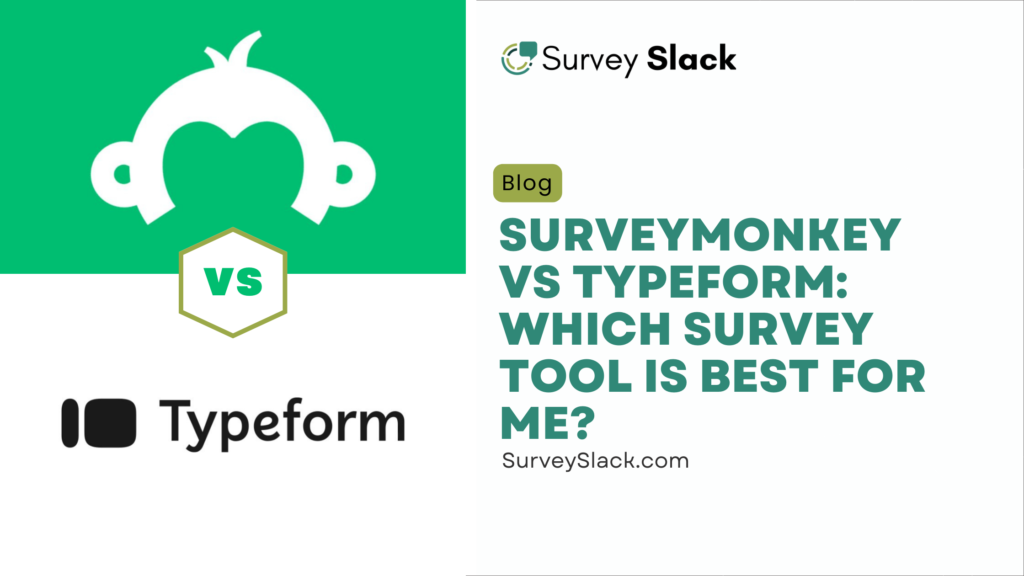
Picture this: when you decide to create a survey, it’s like picking the right tool for a job—one size doesn’t fit all. Typeform vs SurveyMonkey is a classic showdown, each offering unique strengths.
SurveyMonkey shines with its powerhouse features, advanced analytics, and a vast library of survey templates, making it perfect for businesses needing in-depth data. Whether you’re conducting an exit interview survey or collecting customer feedback, its robust capabilities have you covered.
On the flip side, Typeform makes surveys feel like a conversation, focusing on design and user experience.
Whether you’re after high-quality insights or engaging surveys, both have something to offer. Let’s dive into how these two giants stack up to help you choose the best survey software for your needs like SurveyMonkey vs Qualtrics.
TL ; DR
- Typeform’s unique approach focuses on user engagement through one-question-at-a-time, visually rich surveys.
- SurveyMonkey is better for complex surveys with advanced data analysis tools and customization.
- Typeform is more visually appealing but lacks the deep analytics and logic of SurveyMonkey.
- SurveyMonkey supports integrations, branching, and advanced features suited for large-scale research.
- Typeform’s interface is user-friendly and customizable for smaller surveys or feedback collection.
- SurveyMonkey excels in offering a comprehensive set of reporting tools for data-driven insights.
- Typeform is best for creative, personalized forms, while SurveyMonkey suits corporate-level research.
- SurveyMonkey has a broader range of pricing tiers for different needs.
What is Typeform?
Typeform is an online survey tool that enables users to create a survey, engaging, conversational surveys, forms, and quizzes. Its unique design presents one question at a time, enhancing user experience and response rates.
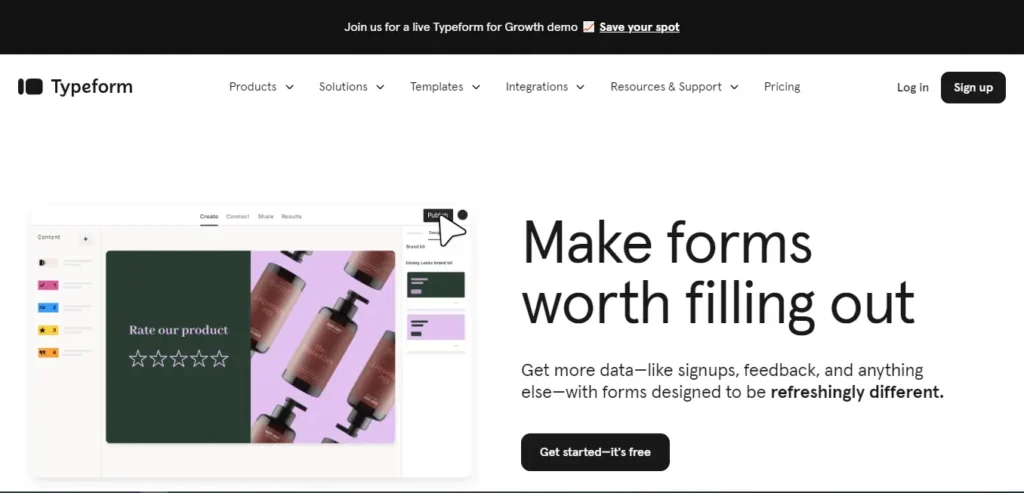
As one of the top feedback collection tools, Typeform offers a variety of customizable templates and integrates with numerous applications, making it a versatile tool for businesses.
Whether you need a sleek online form builder or a powerful tool to gather insights, Typeform provides an intuitive platform for collecting feedback and data effortlessly.
For a visual overview of Typeform’s features, you might find the following video helpful: Typeform Overview in 6 minutes
Suggest Read:
What is SurveyMonkey?
SurveyMonkey is a cloud-based tool that helps you create surveys and gather feedback. As an online survey creator, it’s easy to use, with customizable templates and advanced analytics. You can integrate it with over 100 apps, making it perfect for businesses that need to gather feedback.
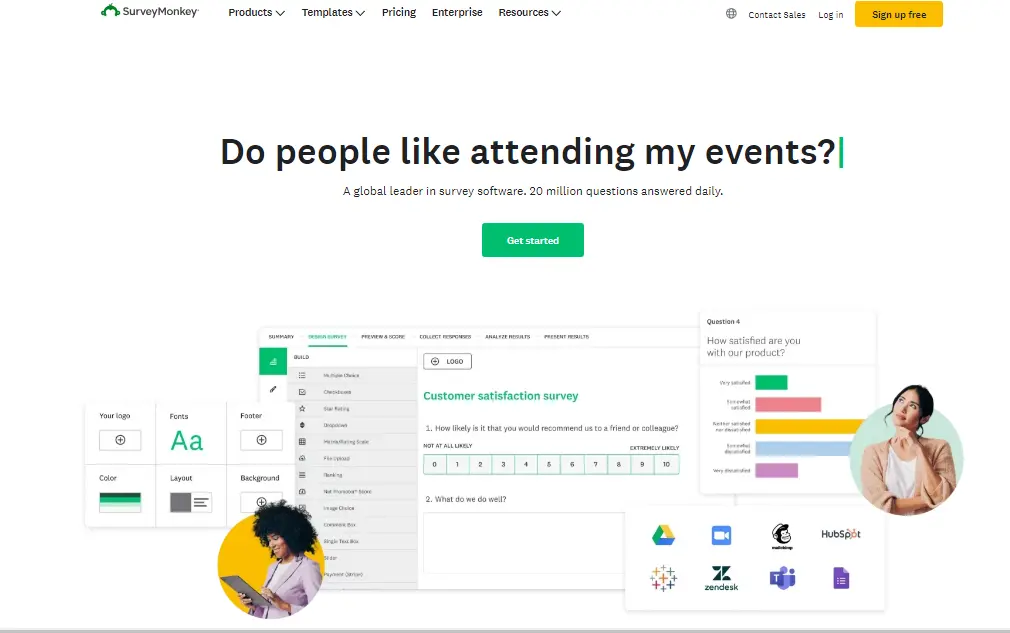
Plus, it simplifies survey creation, letting you craft forms using its intuitive online form builder to fit your needs and gather valuable insights without a hassle.
Whether you’re crafting basic surveys or complex forms, SurveyMonkey has you covered with both ease and powerful features.
For a visual overview of SurveyMonkey’s features, you might find the following video helpful: SurveyMonkey Overview in 6 minutes
Suggested Read:
Typeform vs SurveyMonkey: Features
Regarding online survey tools, both Typeform and SurveyMonkey offer robust features tailored to different needs. Let’s break down their key offerings:
Typeform Features:

- Design and User Experience: Typeform is renowned for its engaging, conversational design. It presents one question at a time, creating an interactive experience that can boost response rates.
- Customization: Offers a variety of customizable templates, allowing users to tailor surveys to their brand’s aesthetics. While it provides a good balance of function and usability, it may not offer the same level of deep customization as SurveyMonkey, especially for users seeking extensive design flexibility.
- Integrations: Integrates with numerous applications, enhancing its versatility for various business needs. Supports over 120 integrations, including popular tools like Google Sheets, Mailchimp, and Zapier, facilitating seamless data collection and analysis across platforms.
- Data Analysis: Provides intuitive data analysis features, including real-time respondent drop-off tracking and campaign tracking. These tools help optimize surveys and understand respondent behavior, leading to higher completion rates.
- Logic Jumps: Allows for advanced logic jumps, enabling personalized survey paths based on respondent answers.
- Mobile Responsiveness: Ensures surveys are optimized for mobile devices, providing a seamless experience for respondents on the go.
- Security: Utilizes 128-bit SSL encryption to protect respondent data.
- Data Export: Allows users to export data in various formats, including CSV and XLS, for further analysis.
- API Access: Offers a free API, enabling developers to integrate Typeform with other applications and workflows.
- Templates: Provides a wide range of pre-designed templates for various use cases, including quizzes, research, feedback, and lead generation.
SurveyMonkey Features:

- Data Analysis: Excels in data analysis and reporting, offering detailed insights that are crucial for comprehensive market research or feedback collection.
- Customization: Provides robust customization options, including the ability to edit the actual HTML of the survey, allowing for a high degree of design flexibility.
- Integrations: Integrates with over 100 applications, facilitating seamless data collection and analysis across various platforms.
- Security and Compliance: Offers robust security features and compliance with standards like PCI, HIPAA, GDPR, and WCAG 2.1. This makes it a reliable choice for organizations that require stringent data security and compliance measures.
- Survey Logic: Utilizes advanced survey logic, including question skip logic, advanced branching, and disqualification logic, to personalize the survey experience.
- Question Bank: Provides access to a question bank with hundreds of pre-written questions, aiding in survey creation.
- Multi-Page Surveys: Supports multi-page surveys, allowing for longer and more detailed questionnaires.
- Custom Variables: Allows the use of custom variables to personalize surveys and track responses.
- Data Export: Offers various data export options, including CSV, XLS, and PDF, for comprehensive analysis.
- Team Collaboration: Provides team management tools, enabling collaboration among team members on survey creation and analysis.
Which Survey Tool Takes the Win?
- Choosing the right survey tool is like picking the perfect pair of shoes: it’s gotta fit your needs. Typeform is the stylish, sleek option. It’s all about the experience, with beautiful designs and simple questions, which is a perfect Typeform alternative. SurveyMonkey is a powerful and practical workhorse. It’s got all the bells and whistles for serious data analysis. So, what’s your style? Design or data?
Typeform vs SurveyMonkey: Usability
Usability is paramount when creating surveys. Let’s explore how SurveyMonkey vs Typeform compare in this department.

Typeform Usability:
- User-Friendly Interface: Typeform’s intuitive drag-and-drop builder makes survey creation a breeze, even for those with minimal technical expertise.
- Design Flexibility: Offers a variety of customizable templates, allowing you to tailor surveys to your brand’s aesthetics.
- Engaging Experience: Its one-question-at-a-time format keeps respondents engaged, potentially leading to higher completion rates.
SurveyMonkey Usability:
- Comprehensive Features: Provides a wide array of question types and advanced logic options, catering to complex survey needs.
- Data Analysis Tools: Equipped with robust analytics and reporting features, enabling in-depth data interpretation.
- Integration Capabilities: Seamlessly integrates with over 100 applications, enhancing its versatility for various business needs.
Which survey tool takes the win:
Need a quick and easy survey? Typeform’s your go-to. It’s like a breeze, simple and stylish. Want to dive deep into data? SurveyMonkey’s your partner. It’s got all the bells and whistles for serious analysis. Choose your weapon: A sleek survey or a data powerhouse. It all depends on what you’re fighting for.
Typeform vs SurveyMonkey: Customisable Templates
Creating surveys that really connect with your audience? Customizing templates is key. Let’s break down how Typeform and SurveyMonkey stack up in this area.

Typeform Customisable Templates:
- Design Flexibility: Typeform offers a wide array of customizable templates, allowing you to tailor surveys to your brand’s aesthetics. You can choose from built-in icons, images, and videos, or import your own assets to create a dynamic user experience.
- User-Centric Design: With its one-question-at-a-time format, Typeform ensures a conversational and engaging experience for respondents, which can lead to higher completion rates.
SurveyMonkey Customisable Templates:
- Template Variety: SurveyMonkey provides a selection of templates, though the customization options are more limited compared to Typeform. While you can add your logo and adjust some design elements, the overall flexibility is not as extensive.
- Functionality Focus: SurveyMonkey prioritizes functionality and data analysis, offering robust tools for survey creation and response analysis. However, it may not match Typeform in terms of design flexibility.
Which Survey Tool Takes the Win?
- Need a survey that's as stylish as it is smart? Typeform is your go-to. It's perfect for creating visually stunning surveys that feel more like a conversation than a quiz. But if you're more of a data nerd, SurveyMonkey's your best bet. It's a powerful tool for crunching numbers and getting real insights. So, what's your style? Are you a design diva or a data geek?
Typeform vs SurveyMonkey: Accepting Payments
Typeform and SurveyMonkey both let you collect payments through surveys, but they do it differently. Typeform is more flexible and has better design options, while SurveyMonkey focuses on ease of use and integrations.

Typeform Accepting Payments:
- Payment Integration: SurveyMonkey allows you to accept payments by integrating with Stripe. Once you link your Stripe account, you can add a payment page to your survey, enabling respondents to make payments directly within the survey.
- Use Cases: This feature is particularly useful for collecting fees, donations, or payments for products and services.
SurveyMonkey Accepting Payments:
- Payment Integration: Typeform also supports payment collection by integrating with Stripe. This integration allows you to add a payment field to your forms, facilitating secure transactions.
- Use Cases: Ideal for scenarios where you need to collect payments for events, subscriptions, or product purchases directly through your forms.
Which Survey Tool Takes the Win?
- Both platforms let you collect payments via Stripe. The choice comes down to your needs. Typeform is great for creating fun, interactive surveys, which can make the payment process feel smoother. SurveyMonkey keeps it simple with its payment setup. Think about what fits your style and goals before deciding.
Typeform vs SurveyMonkey: Form Analytics
When it comes to analyzing survey data, both Typeform and SurveyMonkey offer robust tools, each with its unique strengths.

Typeform Form Analytics:
- Real-Time Drop-Off Tracking: Typeform provides real-time tracking of where respondents drop off in your survey, allowing you to identify and address potential issues promptly.
- UTM Tracking: It supports UTM tracking, enabling you to see where your respondents are coming from, which is valuable for understanding the effectiveness of your marketing campaigns.
- Conditional Logic and Calculations: Typeform allows you to add conditional logic and calculations to your surveys, providing tailored data to respondents and enhancing the conversational experience.
SurveyMonkey Form Analytics:
- Advanced Data Analysis: SurveyMonkey offers comprehensive data analysis tools, including the ability to create word clouds, charts, and more, to help you understand how respondents feel.
- Integration with Business Intelligence Tools: It integrates with over 100 applications, including popular business intelligence tools, allowing for seamless data analysis and reporting.
- Security and Compliance: SurveyMonkey ensures data security and compliance with standards like PCI, HIPAA, GDPR, and WCAG 2.1, making it suitable for sensitive data collection.
Which Survey Tool Takes the Win?
- If you want real-time insights and the ability to customize the survey, Typeform’s analytics are spot on. But if you need deeper data analysis and solid integrations with other tools, SurveyMonkey has you covered. Pick what suits your data needs and survey complexity. Simple as that!
Typeform vs SurveyMonkey: Pricing
When choosing between Typeform and SurveyMonkey, understanding their pricing structures is essential to determine which platform aligns best with your budget and survey needs.
Typeform Pricing

| Plan | Price | Features |
|---|---|---|
| Basic | $25/month |
|
| Plus | $59/month |
|
| Business | $99/month |
|
| Enterprise | Custom pricing |
|
| Growth Essentials | $166/month |
|
| Growth Pro | $291/month |
|
| Growth Custom | Custom pricing |
|
SurveyMonkey Pricing:
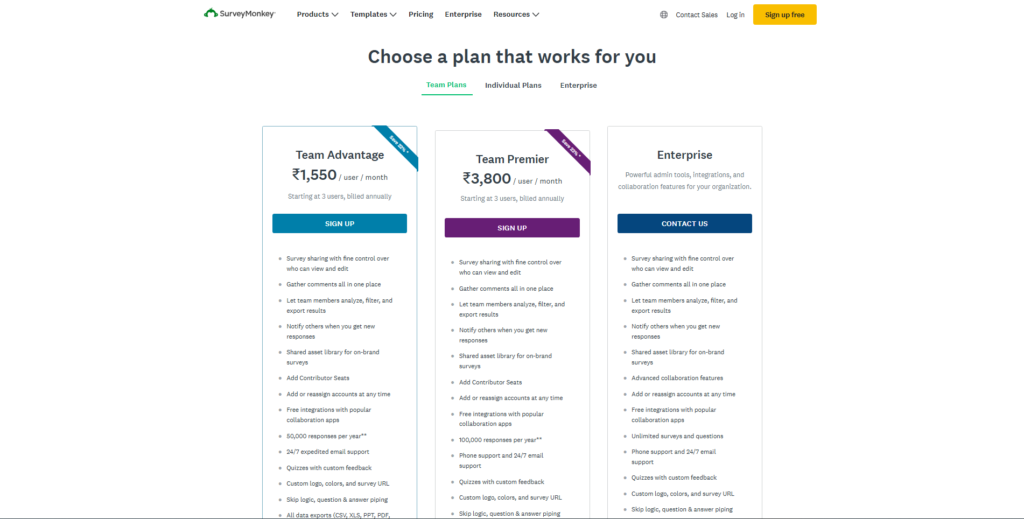
Team Plans
| Plan | Price | Features |
|---|---|---|
| Basic Team Plan | Starts at $25 per user per month (billed annually) |
|
| Advanced Team Plan | Starts at $75 per user per month (billed annually) |
|
Individual Plans
| Plan | Price | Features |
|---|---|---|
| Basic Plan | Free |
|
| Standard Plan | $32 per month (billed annually) |
|
| Advantage Plan | $99 per month (billed annually) |
|
Enterprise Pricing
| Plan | Price | Features |
|---|---|---|
| Custom Pricing | Tailored solutions |
|
Which Survey Tool Takes the Win?
- Typeform vs SurveyMonkey both offer free plans for basic surveys. Need more? Typeform’s Professional Plan costs $59/month and packs in extra tools. SurveyMonkey’s Premier Plan, at $75/month, gives you similar features. Choose based on what you need, your budget, and how big your survey is. Keep it simple, right?
Typeform vs SurveyMonkey: According to G2
When you stack up Typeform vs SurveyMonkey, G2’s user reviews are a goldmine. They’ll help you choose the right tool for your needs, quick and easy:
- Ease of Use: Both platforms are rated highly for ease of use, with SurveyMonkey and Typeform both scoring 9.2 out of 10. This suggests that regardless of which tool you choose, you’ll have a user-friendly experience creating and managing your surveys.
- Ease of Setup: SurveyMonkey takes a slight lead here with a score of 9.0, compared to Typeform’s 8.9. This means that if getting started quickly is your priority, SurveyMonkey might have a slight advantage in terms of initial setup.
- Ease of Administration: SurveyMonkey again has a higher score, 8.9, compared to Typeform’s 8.8. For users looking to manage a large number of surveys or complex data, SurveyMonkey’s administration tools might be more intuitive.
- Quality of Support: SurveyMonkey is preferred with a score of 8.6, while Typeform received an 8.4. If top-notch customer support is a priority for you, SurveyMonkey might have the upper hand, offering more reliable assistance when you need it.
- Feature Updates and Roadmaps: This is where Typeform shines. With a slightly higher rating, users appreciate the continuous improvements and the innovative features that are added to Typeform’s platform. If you’re looking for a tool that’s consistently evolving with new features, Typeform could be the better choice.
- Pricing: While Typeform offers a free plan that allows users to create basic surveys, SurveyMonkey requires a paid plan for many of its advanced features. Pricing is often a deciding factor, and Typeform’s free tier makes it an appealing option for businesses just getting started or those with limited budgets.
What Customer Reviews Reveal About Typeform vs. SurveyMonkey?
When it comes to choosing between Typeform vs SurveyMonkey, real user experiences can offer valuable insights. Let’s explore key points highlighted in their reviews.
SurveyMonkey Customers Say…
Strengths
SurveyMonkey is highly praised for its user-friendly interface and efficient survey creation process. G2 reviewers have noted:
SurveyMonkey makes getting critical feedback fast and easy. I like that the program suggests questions and responses, which cuts down my workload in half and practically builds some surveys for me.
Create professional surveys via easy-to-use templates. Making a survey with this platform is very simple because it has very good, ready-to-use professional templates, and anyone in our team can create great online polls, surveys, and quizzes in just a few minutes.
Concerns
Despite its strengths, some users have expressed concerns regarding pricing and reporting features:
The pricing structure is an absolute nightmare. The locking you in for a year to get any reasonable amount of sends or the ability to have two people access the platform is deeply frustrating.
The reporting is fine but lacking in robust features. I do not feel comfortable simply delivering the platform-generated reports to management for review.
Typeform Customers Say…
Strengths
Users commend Typeform for its engaging design and ease of use:
Excellent user experience. I loved designing the typeforms, and their customer support was excellent, something I really value.
Concerns
Some users have noted that Typeform’s functionality isn’t as extensive as SurveyMonkey’s, but what it lacks in function, it gains in form.
Which should you use — Typeform vs SurveyMonkey?
The answer ultimately depends on your specific needs, the type of survey you’re creating, and the experience you want to deliver. Let’s break it down further to help you make a more informed decision.
Use SurveyMonkey if you need:
- Robust analytics and reporting: SurveyMonkey excels in providing detailed insights with powerful analytics, ideal for teams and businesses that need comprehensive reports to make data-driven decisions. Its built-in reporting features and integrations with CRM systems and apps like Slack, Google Sheets, and more make it a versatile option for teams.
- Enterprise-level features: If you’re working in a larger business or enterprise setting, SurveyMonkey offers extensive features like A/B testing, advanced logic, and integrations that cater to complex survey needs.
- Pre-built templates for rapid deployment: With a large library of pre-designed, customizable templates for everything from market research to employee feedback surveys, SurveyMonkey makes it quick and easy to get your survey up and running.
- Team collaboration: SurveyMonkey allows multiple team members to collaborate on a survey project, making it ideal for larger teams needing input from various departments or stakeholders.
- SurveyMonkey is the go-to choice if you need a reliable, data-rich tool for large-scale surveys with detailed analytics. It’s perfect for businesses that prioritize in-depth analysis, scalability, and seamless integrations with other business tools.
Use Typeform if you want:
- A conversational, engaging survey experience: If you’re looking to create surveys that are more interactive and fun for respondents, Typeform excels in creating surveys that feel more like a conversation than a traditional questionnaire. This can boost completion rates and engagement.
- Beautiful, customizable designs: Typeform allows you to customize surveys and forms with stunning visuals. Its design-first approach makes it ideal for anyone looking to create visually appealing forms and surveys that stand out.
- Simplicity and ease of use: Typeform is known for its simple, intuitive interface that makes survey creation a breeze, even for beginners. Its minimalist approach means you can create beautiful surveys quickly without the steep learning curve of more complex platforms.
- Flexibility in survey types: From quizzes and feedback forms to event registration and lead generation forms, Typeform offers a wide range of use cases beyond just surveys, making it a great choice for businesses looking for flexibility in form creation.
Ultimately, we’ve uncovered the survey tool that stands out as your top choice, along with an unexpected gift!
With that in mind…
What if we told you there’s a platform that blends the simplicity of SurveyMonkey with some of the advanced features of Qualtrics—and it’s affordable for small businesses?
Enter SurveySlack an online survey maker & best form builder in the market. Whether you’re creating surveys with various question types, including Likert scale examples, making it ideal for gathering detailed respondent opinions on a scale of agreement or frequency for your team, customers, or students, SurveySlack offers:
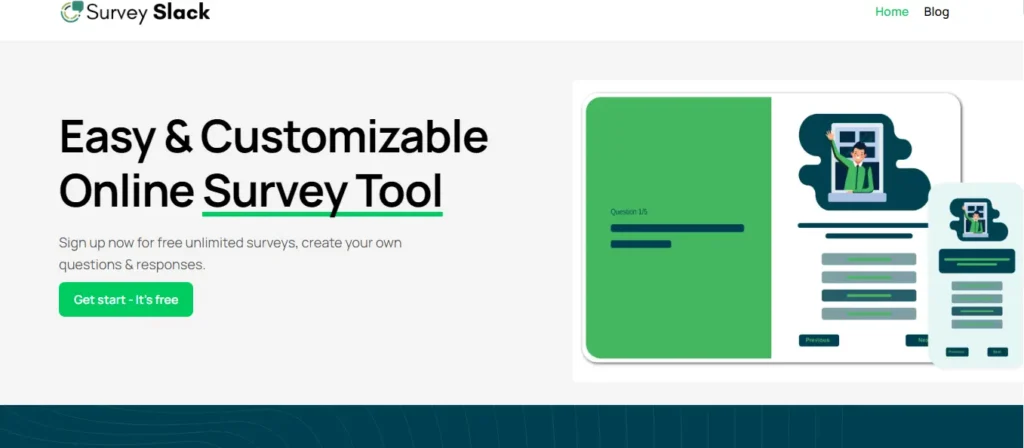
- A user-friendly interface without sacrificing powerful features.
- An AI Survey Questions Generator that works smoothly and freely.
- Pre-made survey template for Customer Feedback Survey Templates, and Employee Feedback Survey Templates.
- Affordable pricing that works for small businesses and individuals.
- More.
Ready to take your surveys to the next level? Explore SurveySlack Premium now and enjoy an exclusive 3-month FREE coupon! Experience all the powerful features—like automation, data insights, and user-friendly survey creation tools—completely on us.
Typeform vs SurveyMonkey: Conclusion
When it comes to picking between Typeform vs SurveyMonkey, it really boils down to what you need and which one is the best online survey tool.
SurveyMonkey is a powerhouse. If you’re after detailed data, reporting, and a tool that can grow with you, it’s your go-to. It’s built for big businesses that need to analyze data, manage teams, and integrate with other tools. Think advanced features, templates, and solid analytics—it’s perfect for enterprise-level needs.
Typeform, though? It’s all about engagement and design. If you want your surveys to feel more like a conversation and less like a form, Typeform’s your pick. Its clean, user-friendly interface and beautiful designs make it great for marketers and small businesses that want their surveys to stand out.
Quick recap:
- Go for SurveyMonkey if you need power, integrations, and serious analytics.
- Pick Typeform if you want surveys that are visually engaging and easy to use.
- Give SurveySlack a try at SurveySlack.com. It’s winning over Businesses, Educational institutions, Individuals, Students, researchers, and academics. Don’t miss out—join the crowd!
All of them are solid choices. Just pick what fits your goals, and you’re good to go.
Happy Surveying!
![Typeform vs. SurveyMonkey: Which Is Better for You? [2025]](https://surveyslack.com/wp-content/uploads/2024/12/SurveyMonkey-vs-Typeform-Survey-Tool-Comparison.png)






